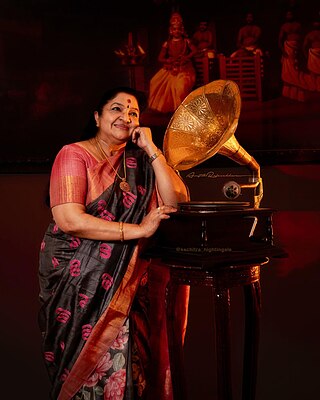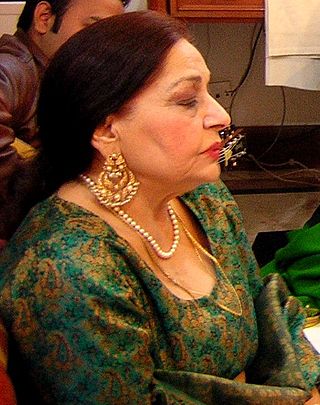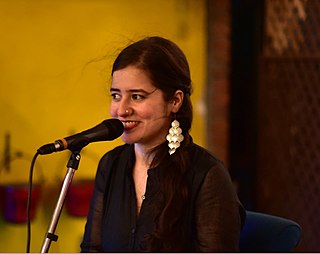Related Research Articles

Owing to India's vastness and diversity, Indian music encompasses numerous genres in multiple varieties and forms which include classical music, folk, rock, and pop. It has a history spanning several millennia and developed over several geo-locations spanning the sub-continent. Music in India began as an integral part of socio-religious life.

Thyagaraja, also known as Thyāgayya and in full as Kakarla Thyagabrahmam, was a composer and vocalist of Carnatic music, a form of Indian classical music. Tyagaraja and his contemporaries, Shyama Shastri and Muthuswami Dikshitar, are regarded as the Trinity of Carnatic music. Tyagaraja composed thousands of devotional compositions, most in Telugu and in praise of Rama, many of which remain popular today, the most popular being "Nagumomu". Of special mention are five of his compositions called the Pancharatna Kritis, which are often sung in programs in his honour, and Utsava Sampradaya Krithis, which are often sung to accompany temple rituals.

Noor Jehan, also known by her honorific title Malika-e-Tarannum, was a Pakistani playback singer and actress who worked first in British India and then in the cinema of Pakistan. Her career spanned more than six decades. Considered to be one of the greatest and most influential singers in Indian subcontinent, she was given the honorific title of Malika-e-Tarannum in Pakistan. She had a command of Hindustani classical music as well as other music genres.

Mangalampalli Balamuralikrishna was an Indian Carnatic vocalist, musician, multi-instrumentalist, playback singer, composer, and character actor. He was awarded the Madras Music Academy's Sangeetha Kalanidhi in 1978. He has garnered two National Film Awards, the Sangeet Natak Akademi Award in 1975, the Padma Vibhushan, India's second-highest civilian honor in 1991, for his contribution towards arts, the Mahatma Gandhi Silver Medal from UNESCO in 1995, the Chevalier of the Ordre des Arts et des Lettres by the French Government in 2005, the Sangeetha Kalanidhi by Madras Music Academy, and the Sangeetha Kalasikhamani in 1991, by the Fine Arts Society, Chennai to name a few.

Bhumika Chawla is an Indian actress who primarily works in Telugu, Hindi, and Tamil films. Chawla made her acting debut with the Telugu film Yuvakudu (2000) and received success with Kushi (2001), for which she received Filmfare Award for Best Actress – Telugu. Chawla went on to make her Tamil debut with Badri (2001), after which she starred in the commercially successful Roja Kootam (2002).

Krishnan Nair Shantakumari Chithra is an Indian playback singer and Carnatic musician. In a career spanning over four decades, she has recorded over 25,000 songs in various Indian languages, as well as foreign languages such as Malay, Latin, Arabic, Sinhalese, English and French. She is also known for her extensive history of collaboration with music composers like A. R. Rahman, Ilaiyaraja, Hamsalekha, M. M. Keeravani and with the playback singers K. J. Yesudas and S. P. Balasubrahmanyam over the years. She is cited as the Golden Voice of India by world’s Prestigious Royal Albert Hall, London in 2001 and Melody Queen of Indian Cinema by Radio Mirchi, The Times Group in 2016. She is honoured with the title First Ladies by the President of India in 2018 for being the first Indian woman to be honoured by British Parliament at House of Commons, United Kingdom in 2003. People of India fondly called her as Little Nightingale of Indian Cinema.

Farida Khanum is a Pakistani classical singer from the city of Kolkata, West Bengal. She is also known by her honorific title Malika-e-Ghazal in both Pakistan and India and is widely regarded as one of the greatest exponents of the ghazal genre of singing. Khanum has been affectionately called Queen of Ghazal in Pakistan.

Okkadu is a 2003 Indian Telugu-language romantic sports action film directed by Gunasekhar and produced by M. S. Raju. The film stars Mahesh Babu, Bhumika Chawla and Prakash Raj. The music was composed by Mani Sharma and editing by A. Sreekar Prasad. In the film, Ajay is a Kabaddi player who rescues Swapna from a powerful factionist Obul Reddy when the latter tries to forcefully abduct her.

Devi Sri Prasad, widely known by his initials DSP is an Indian composer, singer and lyricist. He is known for his works predominantly in Telugu cinema and Tamil cinema. He is the recipient of a National Film Award, a Nandi Award, ten Filmfare Awards, seven SIIMA Awards and five CineMAA Awards.

Pulapaka Suseela is an Indian playback singer associated with the South Indian cinema primarily from Andhra Pradesh for over six decades and is referred to as Evergreen Nightingale of Indian cinema. She is one of the greatest and best-known playback singers in India. She has been recognized by the Guinness Book of World Records as well as by the Asia Book of Records for performing a record number of songs in different Indian languages. She is also the recipient of five National Film Award for Best Female Playback Singer and numerous state awards. Susheela is widely acclaimed as a singer who defined feminism in South Indian cinema and is well known for her mellifluous vocal performances for over 50,000 film and devotional songs across South Indian languages.

Saindhavi is a Carnatic music vocalist and an Indian film playback singer. She has been performing from the age of 12.

Chinmayi Sripaada is an Indian playback singer, working mainly for the South Indian film industry. She is also a voice actor, composer, television presenter, radio jockey, and an entrepreneur. She is the founder and CEO of a translation services company Blue Elephant, a skincare company importing K-beauty to India - Isle Of Skin, and a medi-spa Deep Skin Dialogues in Chennai and Hyderabad. She is often credited as Chinmayee and Indai Haza. She rose to fame for her critically acclaimed song "Oru Deivam Thantha Poovae" from the National Award winning movie Kannathil Muthamittal directed by Mani Ratnam and composed by A. R. Rahman. She was 15 years old when she made her singing debut in Kannathil Muthamittal. She debuted as a Dubbing Artist in director Krishna's Sillunu Oru Kaadhal rendering her voice for Bhumika Chawla, after being referred by one of A. R. Rahman's sound engineers. She debuted as a composer with a short lullaby titled Laali, which she also sang and released as part of Instagram's #1MinMusic. She is also a social activist often raising her voice against issues faced by women and has been the face of the second wave of #MeToo movement in India.

Vidushi Kaushiki Chakraborty is an Indian classical vocalist and a composer. She attended Sangeet Research Academy, and was one of the exponents of Patiala gharana. Her repertoire covers pure classical, Khyals, Dadras, Thumris, Bhajans etc. and several other forms of Indian music. She is the recipient 2005 BBC Radio 3 Awards for World Music in the Asia-Pacific category. She is the daughter of Hindustani classical vocalist, Ajoy Chakraborty and she has held performances with him as well as her husband, Parthasarathi Desikan. In 2020, she was awarded Nari Shakti Puraskar. Kaushiki is also a trained Carnatic Classical Vocalist.
Tina Sani is a Pakistani female singer famous for her classical and semi-classical Urdu Ghazals.
Pakistani folk music refers to the local genre of folk music that originates from Pakistan.

Dolly Guleria is an Indian vocalist, primarily a folk singer in Punjabi with expertise in Punjabi Folk, Shabad Gurbani, Sufi and Ghazal genres of Music. She is the daughter of Professor Jogindra Singh and the legendary folk singer Surinder Kaur, popularly known as 'The Nightingale of Punjab'.
"Aaj Jaane Ki Zid Na Karo" is a geet written by Pakistani poet Fayyaz Hashmi. It was composed by Sohail Rana, an eminent Pakistani composer. It was popularized by noted classical vocalist, Habib Wali Mohammad, who also sang it as a film playback singer for the hit Pakistani film Badal Aur Bijli (1973). The song was also sung by famous ghazal singer Farida Khanum in 1993 for Pakistan Television and repeatedly in her live public concerts. It is sung in Raag Yaman Kalyan.

Vibha Saraf is an Indian singer-songwriter and Bollywood playback singer. She performs folk songs and writes and performs music for soundtracks, primarily Kashmiri folk-inspired songs. Her work has been featured on the soundtracks for the films Raazi, which went to win Best Film in the 64th Filmfare Awards, and Gully Boy, the fourth highest-grossing Bollywood film of 2019. In 2019, she was jointly nominated with Harshdeep Kaur for Best Female Playback Singer for the 65th Filmfare Awards and Best Female Playback Singer for the 20th International Indian Film Academy Awards for the song Dilbaro, from the 2018 drama thriller Raazi.

Shanno Khurana is a noted Indian classical vocalist and composer, from the Rampur-Sahaswan gharana of Hindustani classical music. A disciple of the doyen of the gharana, Ustad Mushtaq Hussain Khan, she is known for performing rare bandish and raag, though her singing style includes genres like khayal, tarana, thumri, dadra, tappa, to chaiti and bhajan. Born and brought up in Jodhpur, she started singing on All India Radio in 1945 in Lahore, later shifted to Delhi, where she continued her singing on All India Radio, Delhi and in concerts and music festivals. She also pursued music education, finally earning her M.Phil. and PhD in music from the Kairagarh University, and has undertakes extensive research on folk music of Rajasthan.

Vidushi Sumitra Guha is an Indian classical vocalist, known for her expertise in the Carnatic and Hindustani schools of classical music. The Government of India honored her in 2010, with the fourth highest civilian award of Padma Shri.
References
- 1 2 Ayushi Maehta (6 June 2017). "MS Runki Goswami". The New Hunt. Retrieved 16 January 2020.
- ↑ HansRaj (3 June 2018). "17 भाषाओं में लोक गीत गाकर रुनकी ने जीता लंदन का दिल" [Runki won the heart of London by singing folk songs in 17 languages]. Jagrabn. Retrieved 16 January 2020.
- ↑ TNN (15 January 2017). "New music director in Telugu cinema". The Times of India. Retrieved 16 January 2020.
- 1 2 3 Abhimanyu Mathur (10 June 2018). "Gurgaon singer performs at Indian High Commission in London". The Times of India. Retrieved 16 January 2020.
- ↑ Bhumika Popli (29 July 2017). "'My aim is to promote India's half-forgotten folk melodies'". Sunday Guardian Live. Retrieved 16 January 2020.
- ↑ Kishori Sud (5 December 2019). "Get Rid Of Sickness Due To Pollution, With Raga Therapy Says Classical Singer, Composer Runki Goswami". Her Zindagi. Retrieved 16 January 2020.
- ↑ Gayatri Rao (15 November 2017). "Raga Chayanat". LemonWire. Retrieved 16 January 2020.
- ↑ Bhumika K (21 April 2018). "Folk tunes to the fore". Deccan Herald. Retrieved 16 January 2020.
- 1 2 "Glorious Indian Folk – Nehru Centre London". nehrucentre.org.uk.
- ↑ Bansari Trivedi J (30 August 2018). "A powerhouse of talent". Deccan Chronicle. Retrieved 16 January 2020.
- 1 2 3 Kota Soumya (29 August 2018). "Bengali singer Runki Goswami talks on folk music and perception in India". Telangana Today. Retrieved 16 January 2020.
- ↑ "Runki Goswami's music heals". The New Indian Express. 30 August 2018. Retrieved 16 January 2020.
- ↑ "Runki Goswami: Scaling Heights of Music" . Retrieved 21 April 2023.
- ↑ MP, Team (27 December 2019). "Runki Goswami's tribute to music legends". millenniumpost.in.